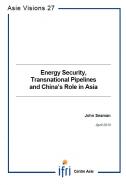Energy Security, Transnational Pipelines and China's Role in Asia

In recent decades, China's transformation from a regional energy supplier to one of the world's largest net energy importers, in particular with regards to oil and gas, has led to an increasing sense of energy insecurity in Chinese policy circles. Guaranteeing adequate supplies of energy to fuel economic growth is a central element in Beijing's efforts to maintain legitimacy in the face of economic reform and transformation. To combat energy insecurity a number of initiatives are being undertaken to diversify energy inputs, suppliers, and the means of their transport.
Among these initiatives are a series of transnational pipeline projects that will transport oil and gas from Eastern Siberia, Central Asia, and Southeast Asia, effectively reducing China's overall reliance on international sea lanes and maritime choke-points, in particular the Strait of Malacca. An analysis of these projects can shed light on how China's energy security policies are playing out on a regional level, how they are complicated and aided by various competing and converging interests of regional actors, and how they are re-shaping traditional regional dependencies. Indeed, more complex interdependencies among suppliers, consumers and transit states in continental Asia are emerging as a consequence of China's growing role as an energy consumer.
In the end, these pipelines help to diversify China's oil and gas suppliers and transport routes, easing its reliance on Middle Eastern oil and maritime transit, but they are by no means an alternative to the latter. China will continue to rely heavily on international oil markets and maritime shipping routes to deliver Middle Eastern oil. Suring up international markets and finding means to cooperate on international maritime security issues are thus and will remain in China's best interest.

Available in:
Regions and themes
ISBN / ISSN
Share
Download the full analysis
This page contains only a summary of our work. If you would like to have access to all the information from our research on the subject, you can download the full version in PDF format.
Energy Security, Transnational Pipelines and China's Role in Asia
Related centers and programs
Discover our other research centers and programsFind out more
Discover all our analyses
RAMSES 2024. A World to Be Remade
For its 42nd edition, RAMSES 2024 identifies three major challenges for 2024.
France and the Philippines should anchor their maritime partnership
With shared interests in promoting international law and sustainable development, France and the Philippines should strengthen their maritime cooperation in the Indo-Pacific. Through bilateral agreements, expanded joint exercises and the exchange of best practices, both nations can enhance maritime domain awareness, counter security threats and develop blue economy initiatives. This deeper collaboration would reinforce stability and environmental stewardship across the region.

The China-led AIIB, a geopolitical tool?
The establishment of the Asian Infrastructure Investment Bank (AIIB) in 2016, on a Chinese initiative, constituted an attempt to bridge the gap in infrastructure financing in Asia. However, it was also perceived in the West as a potential vehicle for China’s geostrategic agendas, fueling the suspicion that the institution might compete rather than align with existing multilateral development banks (MDBs) and impose its own standards.
Jammu and Kashmir in the Aftermath of August 2019
The abrogation of Article 370, which granted special status to the state of Jammu and Kashmir (J&K), has been on the agenda of the Bharatiya Janata Party (BJP) for many decades.







